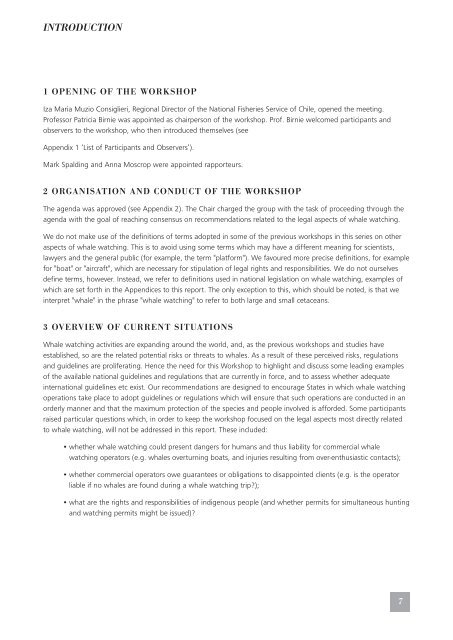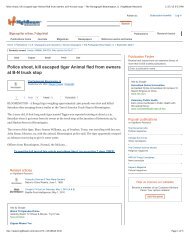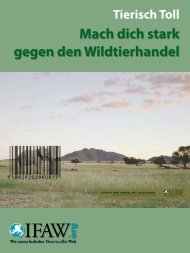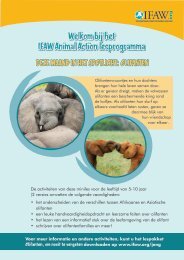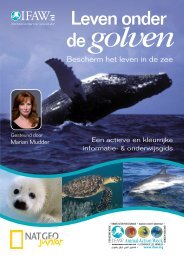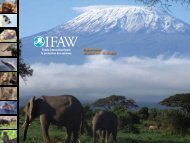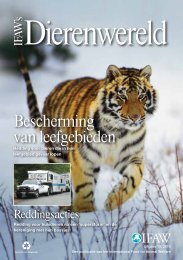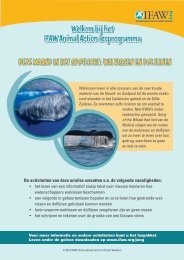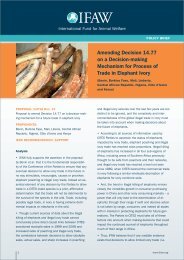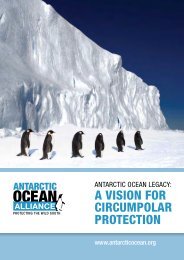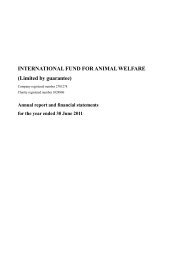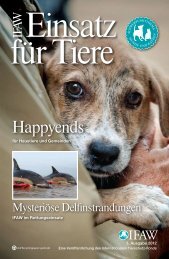leagal aspects of the whale watching.pdf - International Fund for ...
leagal aspects of the whale watching.pdf - International Fund for ...
leagal aspects of the whale watching.pdf - International Fund for ...
Create successful ePaper yourself
Turn your PDF publications into a flip-book with our unique Google optimized e-Paper software.
INTRODUCTION<br />
1 OPENING OF THE WORKSHOP<br />
Iza Maria Muzio Consiglieri, Regional Director <strong>of</strong> <strong>the</strong> National Fisheries Service <strong>of</strong> Chile, opened <strong>the</strong> meeting.<br />
Pr<strong>of</strong>essor Patricia Birnie was appointed as chairperson <strong>of</strong> <strong>the</strong> workshop. Pr<strong>of</strong>. Birnie welcomed participants and<br />
observers to <strong>the</strong> workshop, who <strong>the</strong>n introduced <strong>the</strong>mselves (see<br />
Appendix 1 ‘List <strong>of</strong> Participants and Observers’).<br />
Mark Spalding and Anna Moscrop were appointed rapporteurs.<br />
2 ORGANISATION AND CONDUCT OF THE WORKSHOP<br />
The agenda was approved (see Appendix 2). The Chair charged <strong>the</strong> group with <strong>the</strong> task <strong>of</strong> proceeding through <strong>the</strong><br />
agenda with <strong>the</strong> goal <strong>of</strong> reaching consensus on recommendations related to <strong>the</strong> legal <strong>aspects</strong> <strong>of</strong> <strong>whale</strong> <strong>watching</strong>.<br />
We do not make use <strong>of</strong> <strong>the</strong> definitions <strong>of</strong> terms adopted in some <strong>of</strong> <strong>the</strong> previous workshops in this series on o<strong>the</strong>r<br />
<strong>aspects</strong> <strong>of</strong> <strong>whale</strong> <strong>watching</strong>. This is to avoid using some terms which may have a different meaning <strong>for</strong> scientists,<br />
lawyers and <strong>the</strong> general public (<strong>for</strong> example, <strong>the</strong> term "plat<strong>for</strong>m"). We favoured more precise definitions, <strong>for</strong> example<br />
<strong>for</strong> "boat" or "aircraft", which are necessary <strong>for</strong> stipulation <strong>of</strong> legal rights and responsibilities. We do not ourselves<br />
define terms, however. Instead, we refer to definitions used in national legislation on <strong>whale</strong> <strong>watching</strong>, examples <strong>of</strong><br />
which are set <strong>for</strong>th in <strong>the</strong> Appendices to this report. The only exception to this, which should be noted, is that we<br />
interpret "<strong>whale</strong>" in <strong>the</strong> phrase "<strong>whale</strong> <strong>watching</strong>" to refer to both large and small cetaceans.<br />
3 OVERVIEW OF CURRENT SITUATIONS<br />
Whale <strong>watching</strong> activities are expanding around <strong>the</strong> world, and, as <strong>the</strong> previous workshops and studies have<br />
established, so are <strong>the</strong> related potential risks or threats to <strong>whale</strong>s. As a result <strong>of</strong> <strong>the</strong>se perceived risks, regulations<br />
and guidelines are proliferating. Hence <strong>the</strong> need <strong>for</strong> this Workshop to highlight and discuss some leading examples<br />
<strong>of</strong> <strong>the</strong> available national guidelines and regulations that are currently in <strong>for</strong>ce, and to assess whe<strong>the</strong>r adequate<br />
international guidelines etc exist. Our recommendations are designed to encourage States in which <strong>whale</strong> <strong>watching</strong><br />
operations take place to adopt guidelines or regulations which will ensure that such operations are conducted in an<br />
orderly manner and that <strong>the</strong> maximum protection <strong>of</strong> <strong>the</strong> species and people involved is af<strong>for</strong>ded. Some participants<br />
raised particular questions which, in order to keep <strong>the</strong> workshop focused on <strong>the</strong> legal <strong>aspects</strong> most directly related<br />
to <strong>whale</strong> <strong>watching</strong>, will not be addressed in this report. These included:<br />
• whe<strong>the</strong>r <strong>whale</strong> <strong>watching</strong> could present dangers <strong>for</strong> humans and thus liability <strong>for</strong> commercial <strong>whale</strong><br />
<strong>watching</strong> operators (e.g. <strong>whale</strong>s overturning boats, and injuries resulting from over-enthusiastic contacts);<br />
• whe<strong>the</strong>r commercial operators owe guarantees or obligations to disappointed clients (e.g. is <strong>the</strong> operator<br />
liable if no <strong>whale</strong>s are found during a <strong>whale</strong> <strong>watching</strong> trip?);<br />
• what are <strong>the</strong> rights and responsibilities <strong>of</strong> indigenous people (and whe<strong>the</strong>r permits <strong>for</strong> simultaneous hunting<br />
and <strong>watching</strong> permits might be issued)?<br />
7


